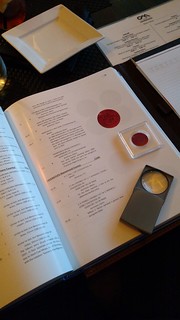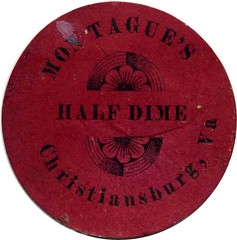
PREV ARTICLE
NEXT ARTICLE
FULL ISSUE
PREV FULL ISSUE
WAYNE'S NUMISMATIC DIARY: MARCH 13, 2016On Tuesday the 9th the March 2016 meeting of my northern Virginia numismatic social club Nummis Nova was hosted by Tom Kays at an Italian restaurant in Springfield called Osteria Marzano. It's a sleekly designed space in an office building in an office park not far from the Capitol Beltway. I work nearby and arrived early. As I pulled into a space in the parking garage another early bird in the next vehicle waved to me - it was Howard Daniel. We made our way inside about 6pm to the nearly deserted restaurant where the staff was working to put our tables together. We took our seats and began reviewing the menus, but not before Howard had teased and charmed our waitress, Marisol. Howard brought with him the manuscript for his next book on Southeast Asian coinage. It was a well-organized binder of pages in sheet protectors, a mix of draft pages and photocopies or scans of source material found during his research. Among the next to arrive were Eric Schena, Dave Schenkman and Gene Brandenburg. All three sat at our end of the table, and they were soon joined by Joe Esposito and Mike Packard. At the other end of our corner of the restaurant were Jon Radel, Tom Kays, Joe Levine, and Steve Bishop. Among the last to get seated in a table the staff slid into the middle were Julian Leidman (at my left) and across from him my guest, Robert Hoppensteadt. I passed out a few next business cards for NBS advertising The Aslum and The E-Sylum. They were nicely designed by Maria Fanning, and I've also been using them as an ad within The E-Sylum in recent weeks. 
Among the first numismatic items passed around were some gargantuan medals from Jon Radel. These were HEAVY, and for perspective on their size, I took this picture next to a quarter from my pocket. 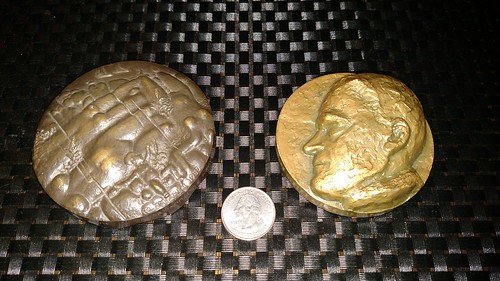
Medals by Kauko Räsänen and Sven Havsteen-Mikkelsen Jon writes: The impetus for bringing these medals was in part a joking response to some medals seen at dinner a few months ago where there had been discussion about how nice high relief is, so let's start with the one on the right. It is a 1980 homage to the 100th anniversary of the birth of Ejnar Mikkelsen (1880-1971), a Dane best known for his polar explorations, in particular those of Greenland. The reverse of the medal is a comparatively undistinguished map of Greenland, which led to discussion about medals with wonderful obverses and reverses where about all you can say is "Well, whatever." The artist is Sven Havsteen-Mikkelsen (1912-1999) who took the subject as a foster father after his parent's marriage disintegrated, eventually adding "Mikkelsen" to his own name; consequently a very personal medal. At the same time, it is a relatively "commercial" medal, having been issued in an edition of 2000 by Anders Nyborg A/S, most famous (in medals, at least) for the Nordic Art Medal Series. See the Spring 2013 issue of The Medal for more on that enterprise. And the high relief? The diameter is 70mm and the thickness is about 24mm at the height of the portrait. The medal on the left is by Kauko Räsänen (1926-2015), a Finnish sculptor/medal artist whom I suspect has better name recognition in the U.S. than any other other Finnish medalist, probably due to a combination of his being the second non-American to win the Saltus Medal Award in 1986, and his pioneering work in multi-component medals. The shown medal was issued in 1985 in honor of the Hanasaaren Kulttuurikeskus ( Hanasaari Swedish-Finnish Cultural Centre) inaugurated in 1975 on an island near Helsinki in honor of Swedish/Finnish relations. This one was issued in an edition of 300 in bronze, including this example, and 10 in silver. Someday I hope to get a better feel for whether the side not shown, which shows a tiny island with trees on the horizon, and a tiny sailboat, with many waves, is in part a joking response to early controversy about the chosen site being too remote and hard to reach. Apparently, by the time the center was built, everyone was happy and it has remained a robust presence in the Finnish cultural life. Thanks! I brought two books with me to the meeting: the new edition of Virginia Tokens and Mike Shutty's new Lost Cents, Dead Owners. 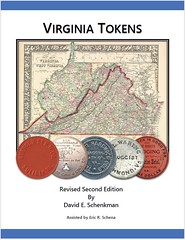
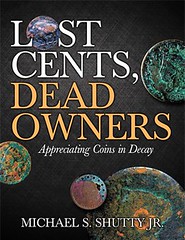
The majority of the tokens illustrated in the book are in Dave and Eric's collections, and all of the modern images of the issuing storefronts were taken by Eric, who has made pilgrimages around the state to visit some of the sites. Some of these visits (many of which were very fruitful) have been described in earlier E-Sylum issues. There's no substitute for shoeleather in numismatic research. Eric brought along a neat piece of cardboard scrip with a Half Dime denomination. It's illustrated in the Virginia Tokens book, and I took this photo of it laying on the page where it's illustrated. Eric writes:
Given the unusual denomination, I would hazard a guess it is from the 1870s or so. Unfortunately, the token was probably pasted in a scrapbook because it has no reverse. It could very well have been blank, but sadly until another one turns up, this is all we know of the token. Here are a couple other cellphone photos of interesting illustrations in the book. 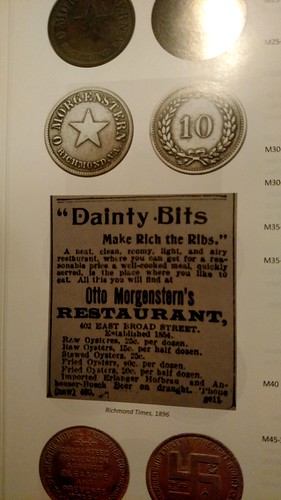 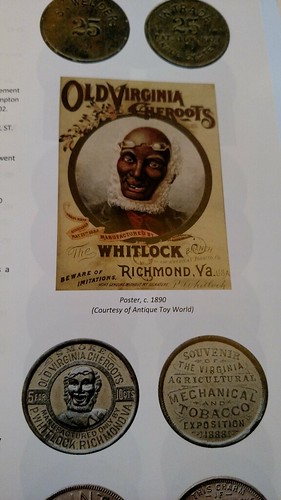
Eric adds: The second item I brought was an imitation $50 slug issued by Thompsons Restaurants in 1906. This is one of the earliest of the imitation slugs and really is a neat thing. Humbert/USAOG slugs are pretty much near the top of my all-time "dream" coins - ever since I was a kid growing up in California I had always wanted one of these massive 2 1/2 ounce hunks of gold and have been captivated by pioneer/territorial gold ever since. Alas, considering that the real thing costs as much as a nice car, it is highly unlikely I will be able to add one to my collection. Thankfully, courtesy of my cataloging for Stack's Bowers, I have been at least able to write about the coins. However, a fascinating sideline are these imitation slugs, especially the earlier ones. I am still just beginning in my collection (the only other one I have is a high grade 1915 Pan-Pac Brinker piece), but so far it has been quite rewarding. 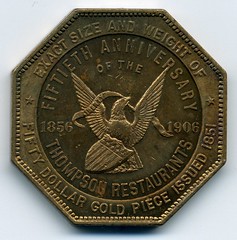 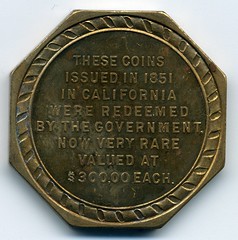
Eric and I also discussed his work as a part-time cataloguer for Stack's Bowers, where he's enjoying the opportunity to do the historical research for some really great coins. The selections in the next article are all lots that he recently worked on. Well done! Other topics of discussion at my end of the table included the 1980 coin boom and subsequent bust, a rare ancient coin displayed by Robert, and counterfeit Southeast Asian pieces that fooled even the expert dealers. 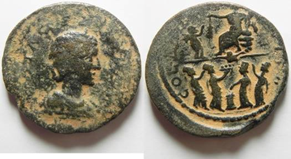
Robert Hoppensteadt provided this information on his coin Syria, Damascus. Otacilia Severa. Augusta, AD 244-249. AE 28mm . Diademed and draped bust right / Sacrifice to Tyche-Astarte: Tyche- Astarte seated left, holding cornucopia and unknown object (probably a rudder, references describe it as a wreath but on this more clear example it clearly isn't,) river god swimming at feet; before her, Marsyas standing right; in exergue, four figures of Cities (Tyche), wearing turreted crowns; the outer two raising their hands toward Tyche-Astarte; one raising a plate of fruit or other offering (again references call this a wreath but it clearly isn't one and the other known examples don't show it this clearly), and the last pouring a libation on an altar. Cf. BMC 433 (Philip I); cf. AUB 266 (Philip I); Lindgren & Kovacs 2388. Fine/ aVF, green and brown patina, some roughness. Rare reverse type. Toward the end of the meal the ever-mischievous Gene Brandenburg instructed me to look at the back of the dessert menu. "Two-thirds of the way down." In a section of after-dinner drinks I found what he was looking at: The Godfather, a mix of Amaretto di Saronno and Whiskey. He bought us each one, and it was smooooth. Thanks! Yet another great evening of numismatic fellowship. I'm very grateful to have such a knowledgeable and friendly group to get together with every month. Forming the group was one of the best numismatic ideas I've ever had (a close second to The E-Sylum itself). Ciao for now, everyone. To read the earlier E-Sylum article, see:
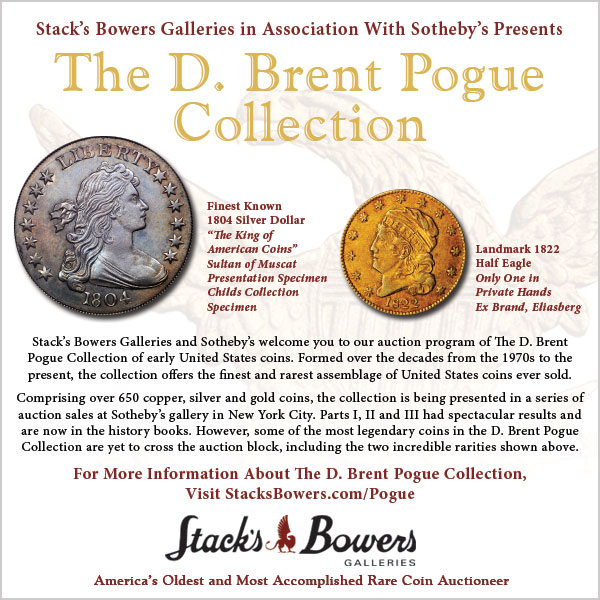
Wayne Homren, Editor The Numismatic Bibliomania Society is a non-profit organization promoting numismatic literature. See our web site at coinbooks.org. To submit items for publication in The E-Sylum, write to the Editor at this address: whomren@gmail.com To subscribe go to: https://my.binhost.com/lists/listinfo/esylum All Rights Reserved. NBS Home Page Contact the NBS webmaster 
|
